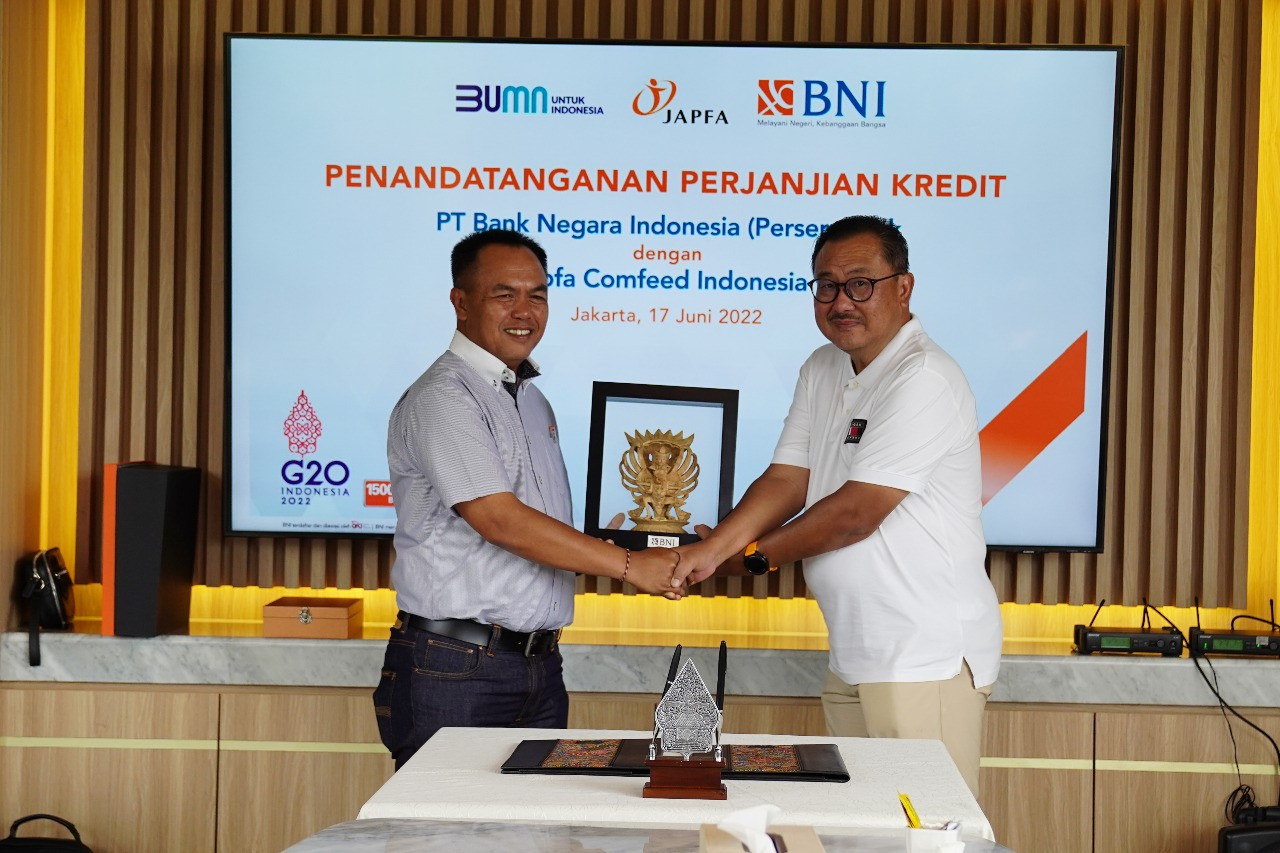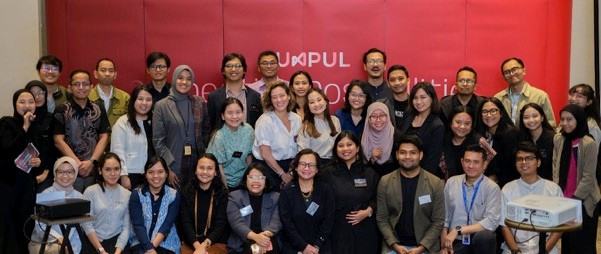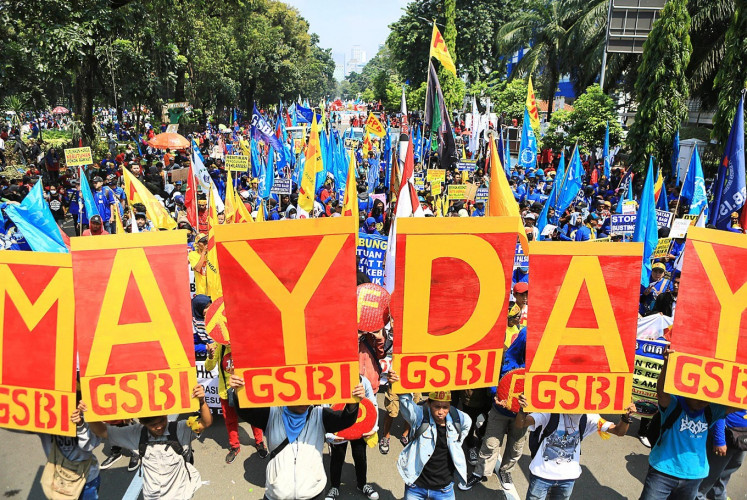BNI channels sustainability linked loans worth Rp 1.42 trillion with Japfa
Change text size
Gift Premium Articles
to Anyone
 BNI corporate banking 1 head I Made Sukajaya (left) and Japfa director Leo Handoko (right) shake hands during a signing ceremony for a deal on sustainability linked loans (SLLs) worth Rp 1.42 trillion (US$95 million) between BNI and Japfa Comfeed Indonesia, in June in Jakarta. BNI continues to drive change toward the future of sustainable business in Indonesia through the five-year bilateral credit facility.
BNI corporate banking 1 head I Made Sukajaya (left) and Japfa director Leo Handoko (right) shake hands during a signing ceremony for a deal on sustainability linked loans (SLLs) worth Rp 1.42 trillion (US$95 million) between BNI and Japfa Comfeed Indonesia, in June in Jakarta. BNI continues to drive change toward the future of sustainable business in Indonesia through the five-year bilateral credit facility.
T
he green banking segment is a vital component in driving a sustainable economy, and the local banking industry has launched a campaign to proactively find high-quality debtors for the segment with the support of the Financial Services Authority (OJK).
PT Bank Negara Indonesia (Persero) Tbk., or BNI, trading under the stock code BBNI, has joined hands with Japfa Comfeed Indonesia Tbk. (JPFA) to finance a sustainability linked loan (SLL) facility worth Rp 1.42 trillion (US495 million). This five-year bilateral credit will be used to fund the agrifood business’ general needs.
BNI corporate banking director Silvano Rumantir said that the five-year SLL credit scheme for the agrifood industry was a first step for BNI, adding that it was part of the company’s continued commitment to[CHA1] supporting green banking’s potential in line with the growing trend of sustainable business investments.
With the BNI-Japfa credit agreement, the bank hopes to continue driving change toward a future of sustainable business and extensive collaboration between the two signatories.
“We appreciate Japfa for its willingness to cooperate with BNI in developing the green banking segment. We hope that Japfa’s business will grow with this financing scheme,” said Silvano.
“In fact, we hope that this will serve as a reference for our other partners in developing their business in a more sustainable direction."
Silvano explained that the credit scheme involved key environmental performance indicators to help achieve the sustainability goal of mitigating the impacts of water pollution. This included the production of clean water through water management, processing and recycling as well as increasing clean water distribution and reducing groundwater extraction.
He added that BNI was looking at potentially financing corporate value chains, cash management, payment channels, supply chains and People’s Business Credit (KUR) for partners, as well as fundraising and loan distribution services as a consumer product for employees.
“All of our banking products are equipped with a solid digital solution for Japfa. We are proactively carrying out BNI’s digital transformation in order to deliver the best service,” Silvano emphasized.
At the signing ceremony in Jakarta in June, Japfa director Leo Handoko said the strategic cooperation with BNI provided additional motivation for the company to achieve its sustainability goals, drawn from its life cycle assessment (LCA) initiated in 2019.
An LCA is a formal, science-based assessment of a company’s production cycle that is integrated with its vertical processes.
In Japfa’s case, this production cycle ranges from feed to chicken products, while the LCA identified wastewater treatment and water management as key focus areas for making positive impacts.
Leo explained that Japfa’s SSL facility had earned a fully aligned second-party opinion (SPO) through certification from Moody's ESG Solutions. This meant that the company had fulfilled the five core competencies of the 2022 sustainability linked loan principles (SLLP).
“Japfa hopes to contribute to the national development goals by producing staple protein foods that are nutritious, safe and affordable through an efficient production system that optimizes resource use and minimizes waste,” he added.
BNI’s go green commitment
Silvano elaborated that the BNI-Japfa collaboration further strengthened the bank’s position, with its high ESG rating from MSCI (Morgan Stanley Capital International). BNI is currently rated A, the highest among Indonesian banks.
At the beginning of the year, BNI issued green bonds worth Rp 5 trillion in preparation for strengthening its environmental financing. The bonds are to be used to support its green banking performance, especially in line with the eleven categories of OJK Regulation No. 60/POJK.04/2017.
At the end of June, BNI’s green financing had reached Rp 176.6 trillion, or 28.6 percent of all loans, with the credit disbursed to companies offering goods or services that have a positive impact on the environment.
BNI has used the bulk of its green financing facility, or Rp 117.9 trillion, primarily to empower micro, small and medium enterprises (MSMEs). The remaining balance has been used to develop environmentally beneficial ecosystems (Rp 16.1 trillion) and new and renewable energy (Rp 12 trillion), as well as pollution management (Rp 7.2 trillion) and water and waste management (Rp 23.4 trillion) systems.
“Outside the business sector, BNI is an Indonesian bank that has been giving serious attention to managing the environment. BNI has carried out various programs, such as coastal rehabilitation at Anyer Beach [in] Banten and the upstream area of the Citarum River basin in West Java through tree nurseries, planting and conservation,” Silvano said.









